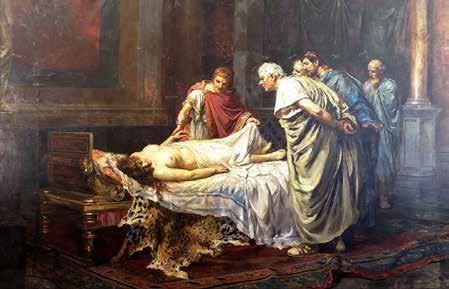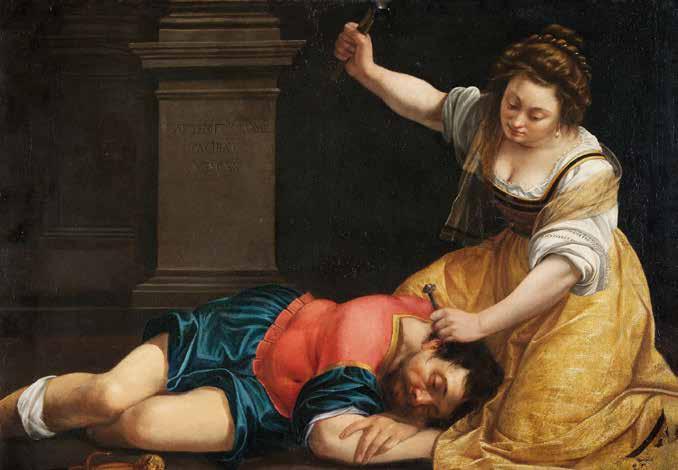
24 minute read
61 Parallel lives: Artemisia and Agrippina Flora Edward
from Ink 2020/21
Parallel lives: Artemisia and Agrippina
Flora Edward Upper Sixth
Agrippina the Younger:
Women in Rome have never been allowed any position of Authority, so we’ve had to adapt, outsmart the men that are so threatened by us. History records me as the wife and mother of men- doing little to detail me as anything more than that. They express outrage at my lack of adherence to societies norms for women- especially women in such a position as mine. But why conform to such rules when it makes life so dull? Why should I, as Great granddaughter of Augustus, adopted granddaughter of Emperor Tiberius and sister to Caligula (however disliked) be denied the same titles and honours as my male counterparts?
Most remember me either as the wife of bumbling Claudius or mother of that Nero, neither of which are crowing achievements, some may also note my exile under the rule of my mad brother. When recorded by historians it is merely to accompany some scandalous rumour or alongside a set of adjectives describing this man or that, never as a person and political actor in my own right. Yet notice how each of these socalled brilliant emperors of Rome came up against hatred, and arguably descended into tyranny? Would not a greater presence of women within the political sphere ensure a more level-headed, less testosterone fuelled decision making process? That aside, it would at least make the senate more representative of the people it claims to serve in the interest of.
I could easily continue with my diatribe of the flaws in the society and political systems of Rome; however, I write to record history as I remember it, not as high minded, uninformed as that noted down by one Suetonius, or Tacitus. Thus, I intent to record history as I remember it, free from the assumptions and accusations so common in other works.
In the history of the Julio-Claudians, you are unlikely to find a woman regarded in such a scandalous light as I. My supposed wrongdoings and misdemeanours are recorded- some say to my luck- by the likes of Tacitus, Suetonius and Cassius Dio; all men. Such men have made me complicit in not one but 3 plots of murder- 2 of which people and society that the elevation of the they suggest succeeded. Likewise, the crime position of a handful of women. Likewise, of ambition falls upon my shoulders, yet the his largesse and mass spending’s left men in my life had the same end goal yet Rome in a precarious position, resulting got hailed hero’s and victors of our empire. in the need for a levelheaded leader to With regard to my involvement in a plot take charge, thus Claudius took the title of to remove dear little boots, well, let’s just princeps. say someone had to do something. Let me also remind you I was not the only one Double standards ran strife through the involved; It was dubbed the Plot of Three streets, lurking around every corner to Daggers for a reason. Both my sister Livilla catch women in acts thought inappropriate Drusilla’s widowed husband Lepidus had for our sex. Roman law would suggest that, an equal hand in attempting to remove upon the untimely death of my second our brother. Gaius should never have been husband Gaius Sallustius Crispus Passienus entrusted with power over Rome and its - whom I had no hand in killing- that I people, squandering our was to become the resources and funds, as well as allowing Terror and Fear to cast their Would not a greater presence property of my Son, Nero. As one who is fully capable of dreadful shadows over of women within handling herself, it the city. Caligula’s reign did the political sphere ensure a more seems as dishonour to hand the control of my life to one bring some benefits to level-headed, who I brought into both me and my sisters, however. Upon him becoming emperor the less testosterone fuelled decision the world. Thus, I deemed it appropriate for me to take power 3 of us became royals, making process? into my own hand. the pinnacle of the societal hierarchy. He I used what influence also had the vows of those swearing oaths I had following my banishment under of loyalty read: I will not value my life or Caligula to work my way into the royal that of my children less highly than I do courts becoming mistress to eminent men the safety of the Emperor and his sisters. until I got close to Claudius. Love never Likewise, we were given the rights of existed between us- he was my uncle after the Vestal Virgins, gaining the ability to all- though I had his ear and his trust, travel by carpentum and to attend public two deadly tools in the art of political games, something few other women were manipulation. capable of. Our dear brother also had coins commissioned in our images, making us Claudius lacks the reputations of those the first women still alive to be formally who preceded him. He was not mad or recognised on coinage. Such honours tyrannical, nor did he have a short temper bestowed upon us allowed us to rise to or a thirst for blood. He is however a position of political prominence not remembered for his close administration of previously achieved by women in Roman Rome, bringing the empire and city back society. from the brink of collapse left behind by Caligula. I was the one pulling the strings. Despite the cruelty exhibited by Caligula, It was my idea to complete the aqueducts one of the only saving grace in all this abandoned by Caligula. I too was the mind is that Caligula is remembered no more behind the Invasion of Britain as well as fondly than I am myself, disgraced for his the annexation of Thrace. My involvement decisions such as that to make himself a in such affairs did not go unnoticed with god and appoint his horse as a priest. That Tacitus siting how I “Put it forth that to me is a far greater insult to the Roman [I] was [myself] a partner in the empire
acquired by [my] ancestors,” Why should I not? I had as much if not more claim to the land and empire of Rome than the man put in charge by the praetorian guards. I was, unlike so many others, of Augustus’ blood, not adopted in like those who rose to power and then fell from grace before me.
I had seen enough examples from Augustus and his successes, to Caligula and Tiberius with their decent into tyranny to feel certain that I knew the do’s and the don’ts of ruling over Rome.
I remained content- for a short while- to be the puppeteer behind the show, but soon my ambition and vision for Rome outgrew the front behind which I hid. No longer could I use Claudius without the notice of the men around him, thus I knew things needed to change.
The poisoning of Claudius was perhaps not as subtle as I had hoped, with suspicion falling upon me sooner that I intended- no doubt due to that freedman Narcissus. I will admit it is one of the few things correctly recorded. My fears were growing that Claudius would have Britannicus succeed him not my Nero, who was fast approaching manhood. But I also knew that, were I to succeed in securing power for myself, Nero needed to be young enough for me to pull his strings much as I had Claudius’. According to Tacitus, my plot went further than the simple removal of Claudius, becoming a “Plot aimed at overthrowing the whole imperial household.” I will admit to contemplating the removal of Britannicus, though such actions would have made my plan more obvious, thereby putting its success in jeopardy. Locusta, a secret friend of mine was the one who
Agrippina Nero on the other hand was more problematic than Claudius had ever been. He was mailable, to an extent, for a fair amount of time but it didn’t take long for such power to go to his head, much as it had with my brother- it must have run in the family. It didn’t take long for him to grow bitter of my position over him and begin looking for a way to remove me, though I would not be the first to die on his orders or by his hand.
suggested to poison the mushrooms- Claudius’ favourite food- and it worked a treat. This left Claudius dead and my Nero ready to be acclaimed imperator before the troops and his new subjects.
Yet again rumours surfaced of the relations between Nero and I, yet again suggesting that I had some sort of sexual intimacy with him that was affording me my position and power. I deny all such contact, he was after all, my son. It may come as no surprise to you that it was Tacitus who recorded such falsehoods, dealing as he so often did in fabricated fiction over fact. I once again attribute such accusations to the lack of precedent for women in power, with men regarding their rise as nothing more than a result of adulterous exploits as opposed to any natural aptitude of my own. In many ways such ignorance on their part aided my plans. They did not perceive me as a threat until it was too late, allowing me to puppeteer Rome and its emperors to my own ends. It is true however, that my popularity was scare among the people of the empire to the point that “all men yearned for the breaking of the mother’s power.” However, this mattered little to me or my plan. Who do you think inspired Caligula to say, “let them hate me so long as the fear me?” I could deal with unpopularity so long as I held my position.
Nero had proved his capability of murder by seeing the end of Britannicus. Suetonius goes to great lengths to detail how Nero “feared that the common people might be lass attached to Claudius’ adopted son than to his real one,” a fear I feel was well placed given the suspicion surrounding his accession to the principate. So, I advised him to seek the help of Locusta- the 2 of us providing her with frequent business- in acquiring a fitting poison. Britannicus died the instant the poisoned cup touched his lips and he was buried with haste, his death dismissed as a tragic result of epileptic seizures, as so eloquently put by Nero. However, with Britannicus out of the picture, I was left the sole object of Nero’s hate and thus became [T]he crime his next target. of ambition This then led to a period falls upon my in which that petulant shoulders, yet the men in my boy did everything in his ability to see that I was disgraced. He stripped life had the same me of my honours and end goal yet got hailed hero’s and powers and expelled me from the Palatine, something Suetonius victors of our appears to record with empire. great pleasure. Likewise he had my bodyguards removed. His tactics got pettier still once I had relocated to one of my numerous country estates. Nero paid handsomely those who willingly drove and sailed past my house shouting and jeering at me at all hours of the day. It was only when I threatened Nero to the point of terror did my son decide that his life would be better if I were no longer in it. In an odd way I am proud of the extent to which he went to try and remove me- he learned from the best. Nero did, however, allow for one flaw in his plan to develop. A person is easier to kill if they are not themselves a killer. Tacitus was clever to suggest that it was ill-advised to “Tamper with the domestics of a woman whose

experience of crime had made her vigilant for foul play.” I knew perhaps before even Nero did, that he would soon be plotting my removal. Thus, I went to Locusta once more. She provided me with the appropriate antidotes needed to fortify my system against any Toxin Nero might have chosen. Plot number one failed. the centurion drawing his sword, I offed up my womb to him, telling him that is where he should strike. He did just that, but my death was not quick and easy but rather drawn out and painful. Those men stood and watched as I finally lost my battle with the plethora of scars that littered my body, bleeding out until the last breath left my lips.
Next his determination saw him rig a custom machine to the ceiling above where I was buried that night, cremated on the I usually slept, the idea being that the very couch on which I had been murdered. panels would drop on me in the night. A Such humble rights, I am certain, of Nero rather ingenious plan trying to reduce my had it not been for one of my many spies within I find it status even now I was dead, indicating to his ranks having warned particularly everyone that I was no me. Plot number two failed. remarkable that a woman should longer- now was I every- empress of Rome. The ungrateful brat did not I was able to survive the have taken part even give his mother masterful conspiracy to have my shipwreck and frame my death as in the expedition against Greece. the honour of a proper burial, earth never being piled over my grave- a an accident. It was a right preformed much well-conceived plan- one which involved a later by my still loyal servants. Thus, I was lot of acting on his part. Both Tacitus and trapped between life and death to witness Suetonius suggest that he lured me to Baiae the tyranny and despotism Nero succumbed “under the pretence of reconciliation,”. As to. He did not outlive me for long however, his mother I was perhaps all to ready to getting what he deserved just 9 years after believe him and boarded the ship he offered my own death. me. The ship sank as plan, yet the boy did not seem to have factored in my ability to Thus, my story comes to an end, this time swim- something most women could not. I told how I wish for it to be remembered. swam to safety near the Lucrine Lake. Plot number three failed. I may have a reputation as one who slept her way to one of the most powerful Such a sting of survival on my part caused positions in Rome- Tacitus yet again having Nero to resort to far less theatrical, and started much of that speculation. That more typical methods for my removal. I was reputation comes at the hands of senators staying at one of my many villas when the and equites who gazed upon my power with day of my death came. I was in my bedroom jealousy and angered when realising that a when Anicetus and his men surrounded woman had different and more accessible the couch on which I lay. The last Act of sources of power. To use one’s resources my life and finally come. Thus, when I saw wisely was key in my rise through roman
Agrippina society and men are all too easily distracted by the allure of women. This cast negativity on my sexual exploits and how I acted in ways inappropriate to tradition, yet they cannot deny that I rose to gain greater power and influence over Rome than many of them ever did.

Artemisia
“I find it particularly remarkable that a woman should have taken part in the expedition against Greece,” were the words used by Herodotus to justify why he recorded me in his history, when there is little mention of other Persian officers, let alone other women. I am well aware of my fortune at having made enough difficulty for the men of the world to have been remembered through time, unlike so many women. Yet a man’s version of my life is not what I wish to have remembers, as I was as much a key actor in the Greco-Persian war as any man who fought- perhaps greater than even Xerxes himself.
For some reason the men of Greece find it next to impossible to comprehend a woman in any position other than that of as a mother and a housewife. Therefore, you can imagen their dislike when they realised, they were losing battles to a woman. Thus, when you hear of the battle of Artemisium, the naval battle concurrent with that of the battle of Thermopylae, you only hear of it as a draw. Those who were there know that in truth it was my men, under my command that secured a victory for the Persian side, the Greek fleet turning tail and fleeing after only 3 days of battle.
I was often described to be one who fought like a man- possibly a description used to justify a Greek defeat at my hand, as no woman could possibly have defeated the mighty Athenian Navy. Likewise, Herodotus sites my ‘manly courage,” as the reason I joined the fight. Neither are entirely true.
I was born to the King of Halicarnassus, King Lygdamis, my mother a woman forgotten to the passage of time. They named me after Artemis, the goddess of the hunt among other things, a woman permitted by the Greeks to live in a way deemed unsuitable for mortal ladies. I did what I could throughout my lifetime to emulate the goddess, not to the point of impiety, but in principle. She could hunt and fight to a level on par, if not greater, than that of her twin Apollo. She did what she wanted and didn’t allow herself to be controlled by any man, though some tried.
I was married to an eminent man within our society- likewise forgotten by history- a marriage that suited my father well, securing peace with the great Anatolian region, and giving him a successor to the throne of Halicarnassus. I ruled by my husband’s side as his queen hence, when my he died, it seemed only natural that I take to the throne, earning me the title of Artemisia of Caria. Some record my son as having been of a suitable age to become the next king, therefor suggesting I took it with no just cause. However, upon my husband’s death our son was a mere boy, unfit to wear the crown of our kingdom. I ruled for some time in peace, keeping Halicarnassus and the surrounding areas prosperous and the people happy. However, such a peace didn’t last long with the rising powers to the East. We had been left alone under Darius. He and his man had reached Greece without us, opting to sail the long way around past Amphipolis. It was under his son Xerxes’ that our position along the Ionian coast made us a prime target for the Persian’s and their war with Greece. Xerxes’ wasn’t going to make the same mistake as his father, and as such he knew that to sail up and around the coast, though safer, would give the Greeks the time they needed to prepare for the coming fight. He arrived in Halicarnassus looking for advice, something I was more than happy to provide. Perhaps that was where the Greeks fell short, diminishing and ignoring women were other cultures appreciated them and treated them as equals. I was the one that advised Xerxes to split his forces. The first batch was sent on the long march across the Hellespont and into Greece through Macedonia and Thrace upon my suggestion. The rest of his forces were to stay in Halicarnassus and build ships as our current fleet was too small to take on any provided by the Greeks. Xerxes stayed with the men at Halicarnassus, overseeing the construction of our feet whilst plotting his next move.
Xerxes stayed by my side as these preparations were being made, allowing me to entertain him and his officers with lavish feasts and entertainment. Such time spent in their company made me accustomed to [T]he men of Greece find their ways, and likewise endeared myself in Xerxes’ eyes, giving me a greater sway over his opinion. Some have speculated whether it next to we loved one another, though no man could impossible to ever hold my heart. comprehend a The moment we got word from a woman in any messenger that the marching troops were position other than that of as nearing Attica, having passed through and medized much of Northern Greece, I was the first Xerxes came to seek advice. I of a mother and a course hastened to too so, considering the housewife. matter at hand and advising accordingly. To get into Greece the Persian troops had chosen to pass through Thermopylae, a narrow stretch now guarded by the Greeks, becoming impassable. It became clear to me, if not those around me, that a diversion would be needed if any success in battle were to be secured. As such I put forward the suggestion of a naval battle in the adjacent bay.
It became known as the Battle of Artemisium and was a Persian victory- one of only a handful throughout the war. As part of the Persian fleet, Xerxes had sent messengers to all the surrounding
Artemisia

cities and client kings to ask for ships, the total amounting to some 1200 ships, placing us at a significant advantage over the 200 ships of the Greeks. This gave us confidence going into the battle, knowing our ability to overwhelm the enemy would play in our favour. As queen I had no need to be present at the battle, however, from a tactical point of view I knew it would give our troops an advantage. desires and Darius before him, all to do with a rebellion sparked by the Athenians. I sat and watched by Xerxes side, present as the news came pouring in; Athens had been abandoned. To many this was excellent news, making the task of capturing the city far easier than had been predicted, though it dud not satisfy Xerxes’ desire to see the Athenians themselves crippled.
Thus debate began among Xerxes closest advisors. Should he make an attack on Salamis, the refuge of the Athenians, or should he be contempt with having taken Athens? To make such a decision he of course looked to his advisors. Mardonius, so keen to redeem his losses under Darius pressed for a battle at Salamis, siting that our navy was more than capable of overwhelming the Athenians once again. He had the overwhelming support of all of Xerxes’ other yes men, making the decision seem unanimous until my opinion was asked. I, myself, advised that the battle should not go ahead. Herodotus records a speech I made stating that to fight with the Athenians at Salamis would be foolish “because at sea [his] men will be as inferior to the Greeks as women are to men,”. My words were not meant to discredit woman- however true they were- but they put my argument into a context these glory hungry men could understand.
I also added to my argument that had he “not [already] captured Athens, which was the point of the campaign?” Xerxes controlled almost all of Greece, with the Athenian’s at Salamis and a collection of Peloponnesians holding out against him.
Many of those that had heard me give this opinion were shocked as it did not fall in line with the opinion previously given by the king. Some suggested that I should be punished for such a reply, others still feeling my words were punishable by death. Contrary to the beliefs of such men, Xerxes praised me for speaking with such honesty. Though he felt compelled by what I had said, he was bound by law to do as the majority wished, giving command to fight at Salamis. Some site the 10,000 drachma price on my head as my motive to avoid such a fight, however, such a bounty did not scare me. the stretches of water, narrow. Some commander had made the foolish mistake of falling for the Greek’s false retreat, following them into the narrow passages around the island. Our large number of ships were a greater hinderance than help in such conditions, the smaller Greek ships having the advantage.
It wasn’t long into the battle that I found myself being pursued by a ship from Attica. I could see no way out, given that there were ships everywhere, blocking every exit. Thus, I made the decision to set a course for the ship of Damasithymus, a ship on the side of the Persians. The King of Calynda had lost my favour prior to the battle, thus I spared no thought when his ship sank, dragging him with it. Ramming this ship cleared the way for me to make my escape. The man persuing me believed my ship to be fighting on the Greek’s side and thus dropped the chase. This allowed me to sit back and watch the rest of the battle until it ended in Persian defeat.
From there Xerxes seemed to be at a complete loss as what to do. Mardonius, like useal, wanted to fight on. Unconvinced by this, and sceptical due to Mardonius’ advice leading to the defeat at Salamis, Xerxes turned to me. “I think you should pull back and leave Mardonius here with the troops he’s asking for, since he’s offering to do that of his own free will,” Is how I advised the king, convincing him that any victory of Mardonius’ was also a victory of his, but any failure could be pinned solely on Mardonius. This argument won the favour of the king and thus we withdrew from Greece, leaving only Mardonius and a handful of troops behind.
The Greeks- namely the Athenians- had positioned their ships in the straights of Artemisium to protect the flanks of those fighting at Thermopylae and to provide backup assistance. However, there was a level of discourse within their ranks and the allied navy was to be commanded by Eurybiades the Spartan, which didn’t sit well with some of the other Greeks. However with the Greeks having positioned their fleet as such, it gave us the perfect opportunity to attack, distracting them from aiding the men on land. Some commend my actions in the battle, Herodotus suggesting that when I fought “I was not the least brave of those who fought at Euboea,”. I did however use a certain trick which appeared to have left a sour taste in the mouth of Thessalus who described me as a pirate and schemer. Admittedly some of my tactics would not have been commended by those who stuck to the codes of war, yet the proved no less useful. One such device was to carry on board 2 flags, one of the Persians and one of the Greeks. Which flag that flew depended on what best suited me. I’d fly the flag of the Greeks to manoeuvre in safety, before ramming the unsuspecting ships.
After a 3-day long battle, and the Greeks disengaging, both sides had sustained roughly equal losses, yet those were losses the Allied Greeks could not afford; half of the Athenian ships were damaged or sunk, putting the Greeks in a more vulnerable position than ever. Word too came from the victory at Thermopylae, giving the land forces direct access into Attica.
Whilst the Persian navy next went to Histiaea, the army marched onwards itno Greece, laying claim to all that they passed. The cities of Boeotia were sacked and burned before the forces turned their attentions towards Athens. The great city of Athens had been the object of Xerxes’ From then on I fade away in the histories of men, only to be a name that corps up her of there. What happened in the rest of my life is uncertain. Some say I lived on in peace, continuing to rule over my people as queen. Others say my life ended after I was rejected by some prince or other, throwing myself dramatically off a cliff. Living on in peace until claimed by old age is far more realistic as to what happened. I allowed the legends of my bravery and skills to echo on throughout time, however what happened after Xerxes left my life will forever remain a mystery.





Tom Hogg




Tom Jackson










